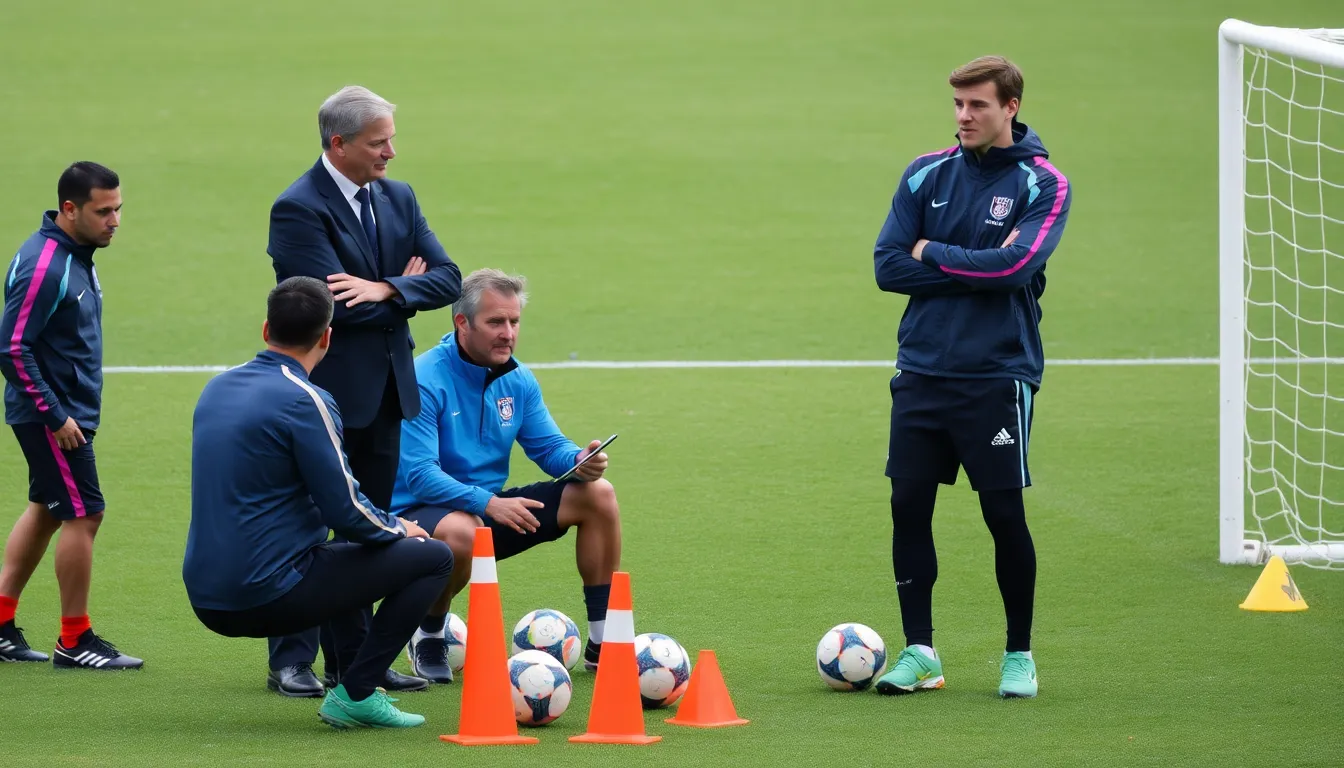In the world of football management, assembling the right team isn’t just about picking star players. It’s about building a dream staff that can turn your tactical genius into a winning reality. Imagine having a coaching staff so sharp they could slice through your opponent’s defense like a hot knife through butter. Sounds good, right?
Table of Contents
ToggleOverview of Football Manager Staff
Assembling a skilled coaching staff significantly influences a team’s success. Coaches play a crucial role in developing players and executing strategies on the pitch.
Importance of Staff in Football Manager
Staff members directly affect team performance. A diverse coaching team brings varied expertise, improving player development and fitness. Coaches handle tactical training and motivate players, creating a winning mentality. They assess player strengths and weaknesses, ensuring effective match preparations. Overall, a strong staff establishes a foundation for consistent success.
Types of Staff Roles Available
Football management features several staff roles, each contributing unique skills. Managers oversee overall strategy and performance. Assistant managers support in-game tactics and daily operations. Coaches specialize in various areas such as goalkeeping, defense, and attack, providing tailored training. Scouts identify and evaluate potential transfers, ensuring the club enhances its talent pool. Additionally, medical staff maintain player health and fitness, addressing injuries to optimize performance. Each role is essential for a comprehensive approach to club management.
Key Staff Roles Explained

Understanding key staff roles is vital in football management. Each position plays a critical part in a team’s overall success.
Manager
The manager coordinates team strategy and tactics. They take responsibility for matchday decisions, player selection, and overall team performance. Additionally, the manager communicates with the board, ensuring alignment on club vision and objectives. Effective managers build strong relationships with players, fostering a culture of trust and motivation. A successful manager also analyzes opponent strategies, devises game plans, and adapts tactics accordingly.
Assistant Manager
An assistant manager supports the head manager in various capacities. They often share in decision-making, particularly during training sessions and match preparations. Strong communication skills are essential, as the assistant manager delivers feedback to players and helps implement tactical changes. In the absence of the head manager, they may assume leadership responsibilities, ensuring continuity within the coaching staff. Building rapport with players and staff promotes a cohesive environment.
Coaches
Coaches focus on specific areas such as defense, attack, or goalkeeping. They develop tailored training programs to enhance player skills and tactics. Each coach’s expertise complements the overall team strategy, allowing for specialized attention. Coaches analyze performances, providing constructive feedback to improve individual and team dynamics. Collaboration among coaches ensures a balanced approach to player development and performance enhancement.
Scouts
Scouts identify and evaluate potential player signings. Their expertise lies in assessing talent and determining how a recruit fits the club’s strategy. Scouting reports offer insights into player performance metrics, physical attributes, and mental resilience. Building networks across leagues allows scouts to discover emerging talents before they gain popularity. Effective scouting is crucial for club development, ensuring a steady pipeline of skilled players.
Medical Staff
Medical staff play a pivotal role in maintaining player health and fitness. They assess injuries and design rehabilitation programs for recovery. With an emphasis on preventative care, the medical team collaborates closely with coaches to monitor player wellness. Regular assessments help prevent injuries and optimize performance. The presence of a strong medical staff ensures athletes remain at peak condition throughout the season.
Staff Attributes and Skills
Staff attributes play a crucial role in the effectiveness of a football club’s management. Understanding these attributes enables managers to build a successful coaching team. Each staff member contributes unique skills that directly affect player performance and team dynamics.
Understanding Attributes
Attributes encompass various skills and qualities that each staff member brings to the team. Communication skills enhance the relationship between coaches and players, fostering a positive environment. Tactical knowledge equips staff with the ability to analyze game situations and develop strategies accordingly. Motivation is essential for inspiring players to reach their potential, while adaptability allows staff to respond to changing circumstances during matches.
Key Attributes for Different Roles
Different coaching roles require specific attributes for optimal performance. Managers benefit from strong leadership and decision-making skills, which guide the overall strategy. Assistant managers should prioritize organizational abilities to ensure seamless operations. Coaches need technical expertise and the capacity to develop tailored training sessions for their players. Scouts thrive with analytical skills, essential for evaluating potential player talent. Medical staff must possess knowledge in health and fitness to maintain player wellness and recovery. Each attribute plays a vital role in forming a cohesive and successful coaching staff.
Building a Strong Staff Team
Assembling a strong staff team serves as a cornerstone of effective football management. Diverse expertise among coaches significantly aids in executing strategies and player development.
Recruitment Strategies
Identifying the right personnel involves a strategic recruitment approach. Assessing candidates’ experience helps prioritize those with proven success in relevant roles. Networking within the football community yields potential hires through referrals. Utilizing data analytics provides insight into staff performance, enhancing selection processes. Evaluating soft skills, such as communication and adaptability, ensures cultural fit within the team. Conducting thorough interviews, including practical assessments, reveals candidates’ tactical knowledge and creative problem-solving abilities.
Staff Training and Development
Continuous training enhances the effectiveness of a football management team. Implementing specialized workshops focuses on key attributes for each role, ranging from tactical analysis to communication strategies. Encouraging mentorship among senior and junior staff fosters a culture of growth. Providing resources, such as access to coaching courses, boosts professional development. Regular performance reviews identify areas for improvement and celebrate successes, aligning staff contributions with team goals. Creating an environment conducive to collaboration strengthens team cohesion and enhances overall staff performance.
Managing Staff Relationships
Managing relationships among staff is crucial for fostering a positive working environment. Smooth communication and prompt feedback create a culture of trust and collaboration.
Communication and Feedback
Effective communication shapes team dynamics. Regular check-ins between the manager and the staff enhance clarity on roles and expectations. Constructive feedback from coaches helps players improve their skills while supporting staff development. It’s important to hold team meetings to discuss strategies, goals, and challenges. Such gatherings encourage open dialogue, allowing everyone to feel valued and heard. Utilizing various communication methods, including email and messaging apps, ensures important information reaches all staff members in a timely manner. Implementing a feedback loop allows staff to express concerns and suggestions, fostering continuous improvement within the organization.
Handling Conflicts
Addressing conflicts promptly minimizes disruption within the team. Encourage open discussions where involved parties can express their viewpoints. Setting up mediation sessions provides a structured approach to conflict resolution. Managers should remain neutral and listen actively to both sides. A collaborative problem-solving approach helps find solutions that satisfy everyone involved. Establishing clear policies for conflict resolution ensures consistency and fairness. Training sessions focused on conflict management equip staff with the skills to handle disagreements professionally. Ultimately, resolving conflicts effectively maintains harmony and promotes a supportive work atmosphere, contributing to overall team success.
Assembling a strong coaching staff is vital for achieving success in football management. Each role within the staff contributes unique skills that enhance player development and team dynamics. By prioritizing effective communication and fostering a positive working environment, clubs can build a cohesive team that thrives on collaboration.
Investing in continuous training and professional growth for staff not only improves their effectiveness but also strengthens the overall performance of the team. Managers should focus on strategic recruitment and evaluating candidates’ soft skills to ensure a good cultural fit. A well-rounded coaching staff can be the difference between mediocrity and greatness on the field.









